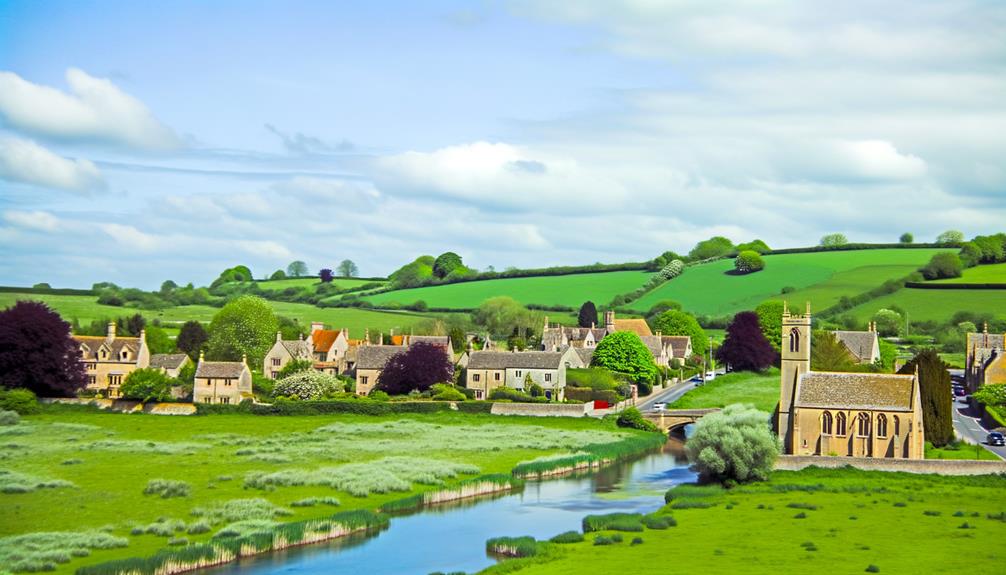Meaning of the Name Preston
Preston is a name rooted in Old English, derived from 'preost' meaning 'priest' and 'tun' meaning 'settlement' or 'town'. This etymology points to a historical context where Preston was likely a community centered around religious leadership.
The name reflects the socio-cultural dynamics of early English settlements, blending spiritual and practical elements. Over time, Preston's significance has extended into literature, place names, and collective identity, symbolizing tradition and stability.
Varied nicknames and adaptations showcase its global versatility. Its popularity has experienced notable surges, particularly in the late 20th and early 21st centuries.
To uncover more layers of its intriguing evolution, continue exploring.

Key Takeaways
- The name Preston originates from Old English, combining 'preost' (priest) and 'tun' (settlement or town).
- It historically indicates a community centered around ecclesiastical authority and religious leadership.
- Preston reflects a blend of spiritual and practical life in early English settlements.
- The name carries cultural significance, appearing in literature and place-naming conventions.
- Variations and nicknames like 'Pres' and 'Prestone' showcase its adaptability and global resonance.
Origins of Preston
The name Preston originates from Old English, derived from a combination of the words 'preost' meaning priest and 'tun' meaning settlement or town, indicating its historical association with a clergy-based community.
This etymological construction reveals much about the socio-cultural context of early English settlements, where ecclesiastical influence often played a pivotal role in community formation and governance. The term 'preost' underscores the centrality of religious figures in these settlements, possibly suggesting that such areas were either founded by or considerably populated with clergy.
Meanwhile, 'tun' reflects the agrarian and communal nature of these settlements. This dual origin underscores a blend of spiritual and practical life, emphasizing the intertwined nature of religious and everyday activities in early English society.
Historical Significance
Why does the name Preston hold such historical significance, and what does its evolution reveal about the sociopolitical and religious dynamics of early English communities?
The etymology of 'Preston' is rooted in the Old English 'Preosta' (priest) and 'Tun' (town), indicating a settlement associated with religious leadership. This suggests that Preston was likely a center for ecclesiastical authority and activity.
During the Anglo-Saxon period, the establishment of religious institutions often catalyzed the development of surrounding areas, reflecting the intertwined nature of religious and sociopolitical structures.
The prominence of such locales in historical records underscores their role in the consolidation of both spiritual and temporal power, highlighting the complex interplay between church and state in medieval England.
Cultural Impact
Examining the cultural impact of the name Preston reveals a multifaceted influence that extends beyond its religious origins to permeate various aspects of societal development, including literature, place-naming conventions, and collective identity formation.
In literature, the name Preston has been employed to evoke a sense of tradition and stability, often associated with characters embodying these traits.
Geographically, numerous towns and cities, particularly in English-speaking countries, bear the name, underscoring its enduring legacy.
Additionally, the name Preston contributes to collective identity, resonating with communities that draw cultural and historical significance from their namesakes.
This widespread usage underscores the name's deep-rooted influence, reflecting its capacity to shape and express communal and individual identities across diverse contexts.
Variations and Nicknames
Beyond its cultural impact, the name Preston exhibits a rich tapestry of variations and nicknames that reflect its adaptability and resonance across different linguistic and social contexts. These forms add layers of personalization and regional flavor to the name, enriching its usage and appeal.
| Variation | Nickname |
|---|---|
| Prestan | Pres |
| Prestonio | Prest |
| Prestone | Tony |
| Presto | P |
In English-speaking regions, "Pres" and "Prest" are common diminutives, offering a casual yet affectionate alternative. In more creative adaptations, "Prestonio" and "Prestone" might be found, each lending an exotic flair while maintaining the name's core identity. This diversity underscores the name's global versatility and enduring charm.
Popularity Over Time
Over the decades, the name Preston has exhibited fluctuating trends in popularity, reflecting broader societal shifts and cultural preferences.
In the early 20th century, Preston was relatively uncommon, but its usage saw a gradual increase mid-century, possibly influenced by a growing appreciation for surnames as given names.
The late 20th and early 21st centuries marked significant peaks, particularly in the 1990s and 2000s, aligning with trends favoring traditional yet distinctive names.
Data from the Social Security Administration indicates periodic surges, driven by cultural factors such as popular media and celebrity influence.
Despite these oscillations, Preston has maintained a steady presence, underscoring its enduring appeal and the cyclical nature of naming conventions.
Conclusion
In summation, the name Preston, originating from Old English, has evolved through various historical and cultural contexts, maintaining a steady presence in naming conventions.
Its variations and nicknames reflect its adaptability and enduring appeal.
For instance, Preston Tucker, an influential American automobile designer, exemplifies the name's association with innovation and impact.
Such examples underscore the name's continued relevance and versatility across different eras and domains, affirming its robust cultural and historical significance.






